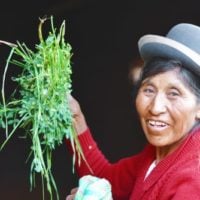Deadline: 22-Mar-22
The Wageningen University & Research (WUR) Centre for Development Innovation (CDI) is pleased to launch a a training course on ‘Plant Genetic Resources and Resilient Seed Systems for Sustainable Food Security’.
Increasing stresses on agricultural systems have resulted in an intensification of the use of natural resources for agricultural production. Many have risen concerns on the future of food and nutrition security, especially for smallholder farmers and their communities. The actual seed systems appear not sustainable if they are to feed more than 9 billion people in 2050. For agriculture to be sustainable, new approaches in seed systems ought to transit from conservation towards resilience.
Bottlenecks in the food supply chain as well as poor access to information and agricultural services are putting agriculture under increasing stress. As a result, smallholder farmers and their communities are facing recurring agricultural crises and food insecurity. One of the responses to deal with the stress has been to intensify the use of natural resources upon which agriculture depends and increase the commercialization of food production. In many parts of the world, this response has led to a reduction of the range of crops and crop varieties cultivated in agricultural systems. To strengthen and (re)build resilience in agriculture through the safeguarding and sustainable use of agrobiodiversity has become a priority.
Topics
The training focuses on the following topics:
- Conceptual framework of resilient seed systems (principles, components and practices)
- Designing a successful intervention for resilient seed systems and food security
- Selection of appropriate germplasm that suits local changing conditions
- Mechanisms and procedures for acquiring (new) planting material
- Participatory plant breeding and climate change adaptation
- Linking ex-situ conservation (seeds conserved in a genebank) with on-farm management of PGRFA (through a community seed bank, seed fairs, diversity blocks)
- Managing PGRFA in dynamic landscapes
- Community empowerment and enhancing resilience
- Supportive policies and laws: a global outlook on successful mechanisms and initiatives
Courses are Currently Online
The courses are currently online and follow this format:
- Pre-course assignments for you to get to know WCDI and for them to get to know your work environment and your expectations about the course;
- Interactive plenary sessions where they share content, review assignments and facilitate exchanging experiences. During those interactive sessions they work with a number of online tools like Google Jamboard, Mural and Mentimeter;
- Group work either online or offline where you with other participants address a specific question or do an assignment. Results of these assignments are also shared and discussed during online sessions;
- Individual assignments where you will read literature, watch videos, and do exercises on your own. These assignments are an essential part of the learning and most of them count for getting the certificate. They are meant to introduce or deepen knowledge and make the link between theory and your own situation. These assignments are reviewed either by peers or facilitators.
In some, but not all courses they go on virtual field visits – showing you ‘live’ situations in the field, or with companies or organisations that they collaborate with. They offer coaching trajectories where they support you one-on-one or in small groups to review your individual learning paths in the course and help with any basic questions you may have.
What will you learn?
Upon completion of the course you will:
- Be familiar with contemporary approaches towards crop conservation and sustainable use of plant and genetic resource for food and agriculture (PGRFA) and resilient seed systems;
- Be able to identify opportunities in your local context to integrate resilient seed systems and food security in implementation strategies;
- Learn mechanism and procedure for acquiring (new) planting material;
- Linking ex-situ conservation (seed conserved in a genebank) with on-farm management of PGRFA through a community seed bank, seed fairs, diversity blocks);
- Designing a successful intervention for resilient seed systems and food security;
- Learn about supportive policies and laws boosting seed systems towards resilience.
For whom is this course?
The training is designed for professionals in public, civil, research, education and/or development organisations, with an interest in agriculture, agrobiodiversity, seeds and food security. Applicants should have at least a BSc degree, have three years of professional experience in a relevant field, and be fluent in English.
Technology Requirements Online Learning
The short courses of 2021 are offered online. Minimum technical and software requirements for online learning courses are:
- Stable internet connection: required to access the online learning platform and assignments (at least 3G mobile network).
- Hardware requirement: access to a laptop, smartphone, tablet or a personal computer with webcam and microphone.
Application Procedure
- Register for the course of your interest by clicking the ‘apply’ button on the webpage of this course. A registration form will open;
- Fill in the required fields of the registration form. Please note to write your date of birth without a zero;
- Before you submit, check your details on the final page of the registration form;
- After submitting, you will receive a confirmation email. Make sure to directly click on the link in the email to confirm your registration. Without your confirmation, your registration cannot be processed;
- If you apply as an OKP or MSP-scholarship candidate, you will receive a registration letter for the scholarship at the beginning of the scholarship cycle.
- If you apply as a self-funded participant: they will forward your request for acceptance to the course leader. This can take some time as it depends on the coordinators’ schedule (1-3 weeks);
- If you’re accepted into the course programme, they will send you an admission letter by e-mail.
For more information, visit https://bit.ly/31jR7ec







































